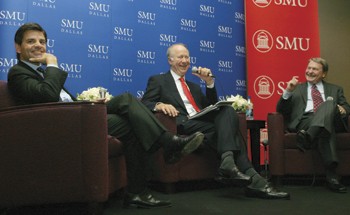
(From left to right) George Stephanopoulos, David Gergen and Jim Lehrer answer questions at the Tate Student Forum held yesterday afternoon in the Hughes-Trigg Student Center. (John Schreiber)
The growing trend on television and more broadly in journalism is biased sensationalism that attracts viewers and boosts ratings. At the Turner Construction Student Forum, George Stephanopoulos and Jim Lehrer provided an insightful look into journalists’ roles in world affairs and politics.
The Student Forum, moderated by David Gergen, provided Stephanopoulos and Lehrer a comfortable setting that allowed intelligent analysis of American politics and the roles of journalists. After brief introductions by Gergen, Lehrer and Stephanopoulos jumped right into the audience’s questions.
Questions from SMU students and area high-school students ranged from the effect of the Internet on journalism to the role of America in Iraq. One of the more interesting questions from the audience asked Stephanopoulos and Lehrer whether the early start to campaigning was a positive or negative situation for the 2008 election.
With regards to the early campaign, Lehrer took a stance that stands apart from the mainstream consensus on the issue.
“This long campaign has been good for our election and country,” Lehrer told the audience. “Quick campaigns often result in nominees who aren’t well known.”
Stephanopoulos agreed.
“America clearly wants a new direction,” he said.
And the candidate with the strongest character that provides a clear new direction will fare well. Forecasting the future, Stephanopoulos elaborated that other candidates may campaign later in the race.
“Michael Bloomberg will be looking to see if in February and March, America is fed up with the main party candidates,” he said.
If that becomes the case, Stephanopoulos would not be surprised if the New York City mayor entered the race.
Another interesting commentary provided by the two panelists was on the subject of the Internet and its role in journalism. Both acknowledged that the Internet has both positive and negative effects.
Lehrer believes that since the Internet provides mass amounts of information and stories, the role of journalists and television show hosts has evolved. Lehrer feels that journalists like him are “the gatekeepers that can filter the news for the public.” This change makes it all the more important for fairness in reporting.
Stephanopoulos and Lehrer agreed about the role of broadcasters, but Stephanopoulos commented on what he fears about the Internet’s effect on Americans. He worries that “people go to sites where they know they are going to like what they hear” and do not challenge themselves with opposing viewpoints.
The discussion led Lehrer and Stephanopoulos to discuss the difficulty of reporting the news fairly and the necessity for a balanced viewpoint. They know this only comes from listening to both sides of the political and world spectrum. If information is reported fairly by people like Stephanopoulos and Lehrer, Americans will choose the candidate best suited for the job of our next president.








